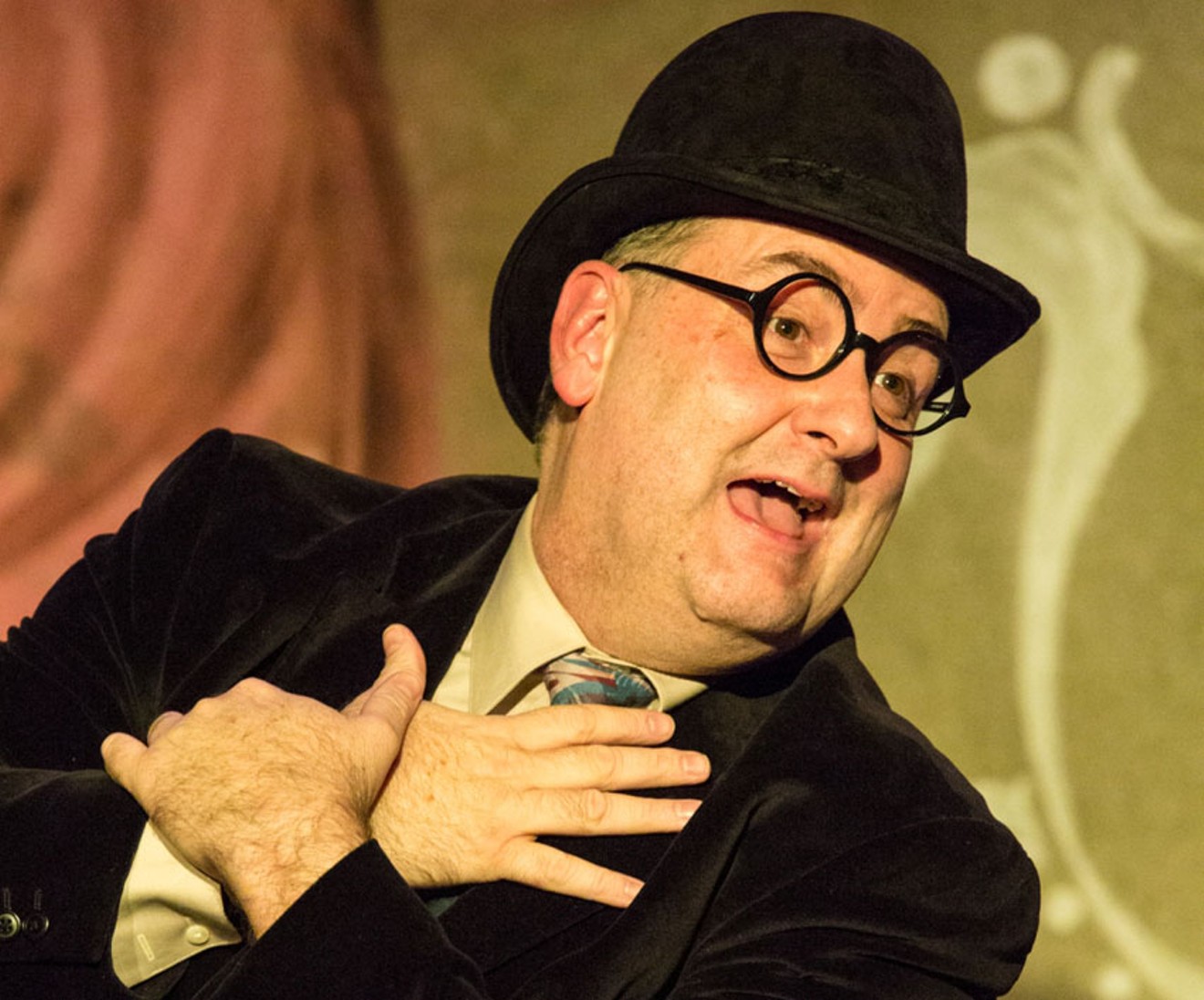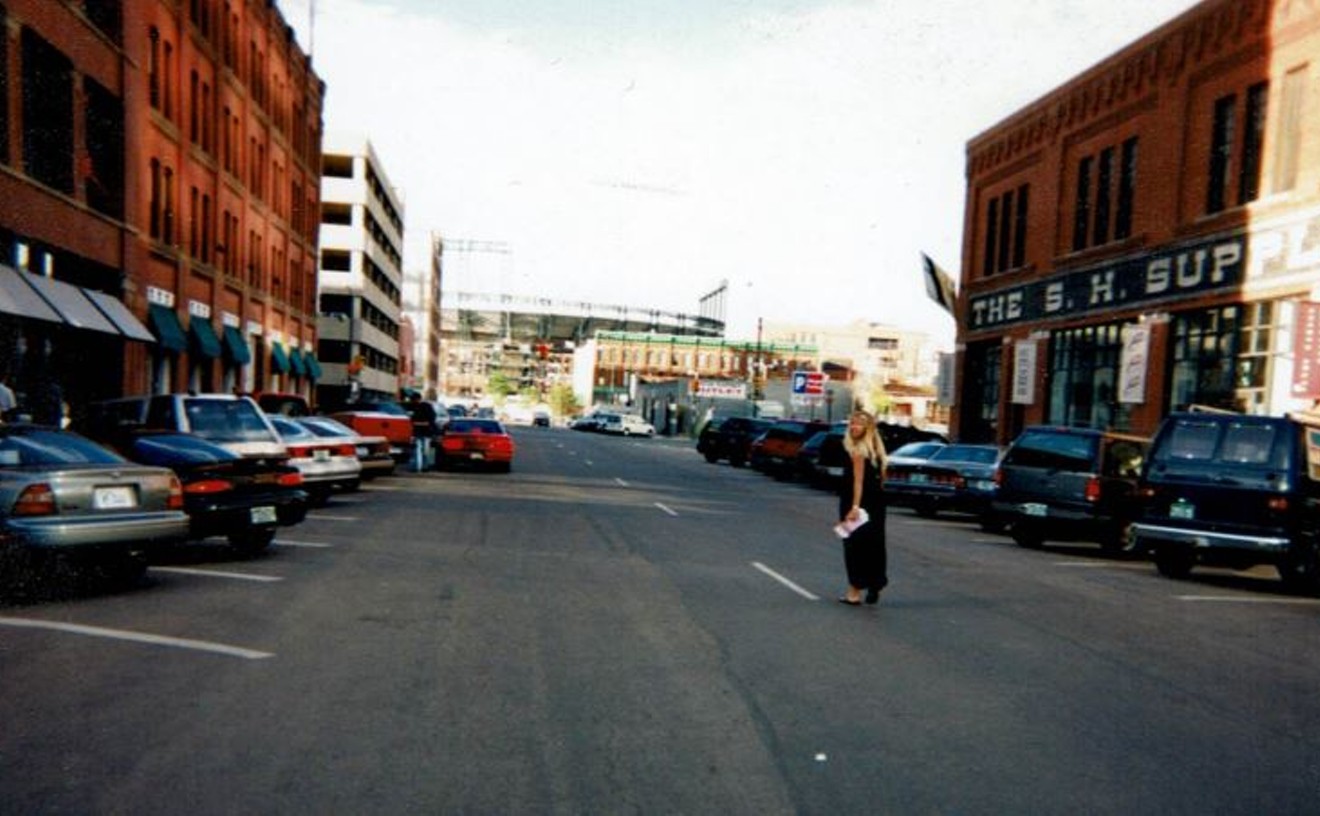Douglas Carter Beane’s The Nance, now seeing its regional premiere at Edge Theater, is a play about burlesque in 1930s New York; it’s a fascinating slice of history, and an equally fascinating character study. The nance, a smirking effeminate caricature, was a regular feature of these entertainments: singing funny, sexually charged little ditties, tossing out double entendres and punning like crazy. Although homosexuals suffered fierce prejudice at the time, the nance — who was often a straight guy in his private life — was viewed as acceptable and highly popular entertainment.
Beane’s protagonist, Chauncey Miles, is proudly — and, of necessity, secretly — gay. We first encounter him in an automat, eyeing the young man at the next table, who’s obviously broke and performing the time-honored trick of transforming ketchup packages and hot water into tomato soup. Chauncey assumes this handsome youngster is rough trade — a straight guy out to make money hustling gays. But in fact Ned is a rather contemporary figure, a man who denied his own sexuality through his teens, got married, and finally, unable to deny his deep longings, left home and fled to New York City. Chauncey is moved to share both his sandwich and his apartment with Ned, but as their relationship progresses, he’s less keen on love and monogamy.
The play intercuts between burlesque acts and scenes in Chauncey’s apartment. Chauncey is brilliant on stage — and Warren Sherrill is brilliant as Chauncey, flapping his hands and making the dumbest jokes zing. In the apartment, he’s less vivid and more diffuse-seeming, torn between pride and profound self-hatred, though even here flashes of the nance act come through. Jihad Milhem gives a sympathetic performance as Ned. We’ve met fictive gay people who shared Chauncey’s crippling insecurities before, in plays starting with Lanford Wilson’s groundbreaking The Madness of Lady Bright in 1964 and continuing through Mart Crowley’s The Boys in the Band, in which one of the main characters, Harold, announces himself as “an ugly, pockmarked Jew fairy.” The narrative changed after the 1969 Stonewall riots as gay pride became a theme and, later, the AIDS epidemic brought stories of fear, death and deep devotion. But the repression and identity insecurity revealed in The Nance still exist. Chauncey is a conservative, a Republican who loathes FDR and rationalizes Mayor Fiorello La Guardia’s vicious crackdown on homosexuality prior to the 1939 World’s Fair. (La Guardia was a Republican, too, concerned about poverty, generally pro-labor and in many ways — but not this way — progressive.) The politics of the turbulent 1930s underlie the action, and it chills the blood to hear Chauncey, sounding like so many Trump supporters, assert that La Guardia doesn’t really mean his homophobic threats; they’re just for public consumption, and he won’t follow through.
Chauncey works most often with Ephram, played by a funny and cynical John Ashton, who’s sometimes a comic partner, sometimes the literal straight man. The burlesque dancers include fiery leftist Sylvie (Patty Ionoff, passionate when she’s not being hilariously wide-eyed and fake-innocent). Sylvie, who thrills to the sound of “The Internationale,” attempts to organize a strike in response to the repression Chauncey suffers. But while Chauncey sometimes shows genuine courage and outrage, he doesn’t want to identify in any way with the militant left.
After Chauncey’s world is shattered, we see the full richness of Sherrill’s performance in the touching contrast between his confident stage character and the fumbling man beneath the makeup. When he testifies in court, his speech is subdued and sober, but eventually the irrepressible nance breaks through. And Sherrill’s appearance in full drag as a streetwalker with the wincingly pun-inspiring name of Hortense (“She looks pretty relaxed to me”) encapsulates all the humor and pathos of this intriguing piece.
Sometimes I wonder at the sheer richness of the current theater scene, the amount of talent we enjoy in Denver, the range of plays and the gutsiness of some of the smaller venues — among them, most decidedly, the Edge, which comes up every season with a rich and varied list that ranges from classical to contemporary, hilarious to tragic. You never quite know what you’ll get around here — which is half the pleasure of going to the theater.
The Nance, presented by the Edge Theater through April 2, 1560 Teller Street, Lakewood, 303-232-0363, theedgetheater.com.
[
{
"name": "Air - MediumRectangle - Inline Content - Mobile Display Size",
"component": "12017618",
"insertPoint": "2",
"requiredCountToDisplay": "2"
},{
"name": "Editor Picks",
"component": "17242653",
"insertPoint": "4",
"requiredCountToDisplay": "1"
},{
"name": "Inline Links",
"component": "18838239",
"insertPoint": "8th",
"startingPoint": 8,
"requiredCountToDisplay": "7",
"maxInsertions": 25
},{
"name": "Air - MediumRectangle - Combo - Inline Content",
"component": "17261320",
"insertPoint": "8th",
"startingPoint": 8,
"requiredCountToDisplay": "7",
"maxInsertions": 25
},{
"name": "Inline Links",
"component": "18838239",
"insertPoint": "8th",
"startingPoint": 12,
"requiredCountToDisplay": "11",
"maxInsertions": 25
},{
"name": "Air - Leaderboard Tower - Combo - Inline Content",
"component": "17261321",
"insertPoint": "8th",
"startingPoint": 12,
"requiredCountToDisplay": "11",
"maxInsertions": 25
}
]












